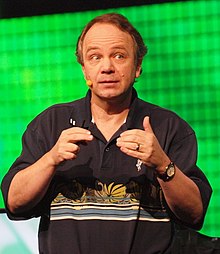Career
Following college, Meier worked in developing cash register systems for department stores. During this timeframe, Meier acquired an Atari 800 around 1981, an experience that led him to the realization of the potential for employing computer programming in the creation of video games. He found a co-worker, Bill Stealey, who had a similar interest in developing games, and shared the games that Meier had developed. The two decided to establish a new company for computer game development subsequent to the widespread advancement and growth of the software and personal computer industries, which were developing extensively during the initial years of the 1980s.
MicroProse
Sid Meier has stated on numerous occasions that he emphasizes the "fun parts" of a simulation and throws out the rest.
— Computer Gaming World, 1994
Meier founded MicroProse with Stealey in 1982. After a few initial 2D action games, such as Meier's platformer Floyd of the Jungle, MicroProse settled into a run of flight simulation titles beginning with Hellcat Ace (1982) and continuing with Spitfire Ace (1982), Solo Flight (1983), and F-15 Strike Eagle (1985), all designed and programmed by Meier.
By 1986, MicroProse was using Meier's name and face in advertisements for its games. In 1987, the company released Sid Meier's Pirates!, the first game with Meier's name in the title. He later explained that the inclusion of his name was because Pirates! is very different from the company's earlier titles. Stealey decided that Meier's name would make those who purchased the flight simulators more likely to play the game. Stealey recalled: "We were at dinner at a Software Publishers Association meeting, and Robin Williams was there. And he kept us in stitches for two hours. And he turns to me and says 'Bill, you should put Sid's name on a couple of these boxes, and promote him as the star.' And that's how Sid's name got on Pirates, and Civilization."
The idea was successful; by 1992, an entry in Computer Gaming World's poetry contest praised Meier's name as "a guarantee they got it right". Meier is not always the main designer on titles that carry his name. For instance, Brian Reynolds has been credited as the primary designer behind Sid Meier's Civilization II, Sid Meier's Alpha Centauri, and Sid Meier's Colonization, while Jeff Briggs designed Sid Meier's Civilization III, Soren Johnson led Sid Meier's Civilization IV, Jon Shafer led Sid Meier's Civilization V, and Will Miller and David McDonough were the designers of Sid Meier's Civilization: Beyond Earth.
After the release of F-19 Stealth Fighter, Meier focused on strategy games, later saying "Everything I thought was cool about a flight simulator had gone into that game." Inspired by SimCity and Empire, he created Sid Meier's Railroad Tycoon and later the game series for which he is most widely recognized, Sid Meier's Civilization, although he designed only the first installment. Around 1990, Stealey wanted to expand MicroProse to produce arcade games, which Meier felt was too risky. Unable to resolve the matter with Stealey, Meier sold Stealey his half of the company, but remained with the company in his same role.
Firaxis Games
MicroProse, after it had become a public company, merged with Spectrum HoloByte in 1993 under Spectrum's name, with Spectrum as the operating company. As a cost-cutting measure, Spectrum cut many of the jobs at MicroProse in 1996 and consolidated much of their operations. Meier, along with MicroProse employees Jeff Briggs and Brian Reynolds, were dissastified with these decisions, and opted to leave the company to form Firaxis Games in 1997.
Firaxis continued to develop the same type of strategy games that Meier had developed at MicroProse, many of which are follow-ups to those titles, such as the new Civilization games and a remake of Sid Meier's Pirates! (2004). In 1996, he invented a "System for Real-Time Music Composition and Synthesis" used in C.P.U. Bach. Next Generation listed him in their "75 Most Important People in the Games Industry of 1995", calling him "a prolific developer of some of the best games in [MicroProse]'s catalog".
According to Firaxis employees, Meier has been constantly developing a special game engine since around 1996 which he uses to prototype his game ideas and which he has not shared with anyone else. Dennis Shirk, a senior producer, said in 2016 that Meier would sometimes arrive at the office and announce he had a new game prototype for the company to try out and see if it could be developed further. The engine is believed by Firaxis employees to be based on his original Civilization source, but expanded over the years with updates that he or other engineers will write for him.
Meier worked with a team on a dinosaur-themed game starting in early 2000, but announced in an online development diary in 2001 that the game had been shelved. Despite trying various approaches, including turn-based and real-time gameplay, he said he found no way to make the concept fun enough. In 2005, he said, "We've been nonstop busy making other games over the past several years, so the dinosaur game remains on the shelf. However, I do love the idea of a dinosaur game and would like to revisit it when I have some time."
An autobiography, Sid Meier's Memoir!: A Life in Computer Games, was published on September 8, 2020, by W. W. Norton & Company.
Development style
Computer Gaming World reported in 1994 that "Sid Meier has stated on numerous occasions that he emphasizes the 'fun parts' of a simulation and throws out the rest". The magazine reported that year how "Meier insisted that discovering the elusive quality of fun is the toughest part of design." According to PC Gamer, "Though his games are frequently about violent times and places, there is never any blood or gore shown. He designs and creates his games by playing them, over and over, until they are fun."

